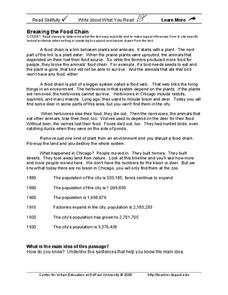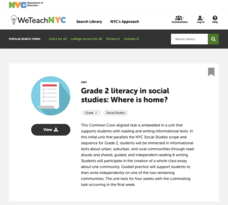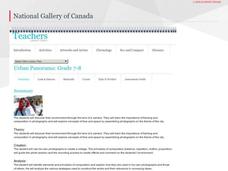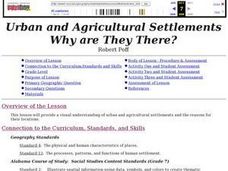Alabama Department of Archives and History
Alabama's New South Era
The industrialization and urbanization of Alabama during the New South era (1865-1914) is the focus of a lesson that asks class members to use primary source documents to examine the impact of industrialization on Alabama workers and...
Curated OER
Identifying Birds
Eighth graders identify and name birds in their school yard by comparing and contrasting pictures of 12 common birds in the Phoenix metro area using the Ecology Explorers Protocol. They formulate questions based on observations that lead...
DePaul University
Breaking the Food Chain
Throughout history, the growth of big cities has resulted in the destruction of ecosystems. In the case of Chicago, IL, a grassland that was once home to bison, deer, wolves, and foxes quickly became a booming city of over three million...
Curated OER
Antonyms 1
Explore antonyms! There are 10 multiple-choice questions here, and learners must choose the answer that represents the opposite of the word in capital letters. Example words include buoyant, urban, and volatile.
Polk Bros Foundation
Meet the Nonfiction Main Idea Challenge
Help your class develop the ability to determine a main idea with a packet of materials that you can introduce and use over a period of time. The packet includes some information for the teacher and rationale for the exercises. There are...
DePaul University
Egypt
The country of Egypt is more than just big pyramids and ancient pharaohs. After reading a brief overview of this African nation, young learners will demonstrate their understanding of the text by identifying the main idea and supporting...
Polk Bros Foundation
Main Idea Analyzer
Show the connection between the main idea and supporting details with a graphic organizer. Pupils fill in the main idea of a text in the circle and the supporting ideas in the boxes connected to the circle.
Polk Bros Foundation
I Can Identify a Nonfiction Writer's Main Idea and Supporting Examples
Use this page to quickly identify the central idea of a text and organize ideas for writing an informational or explanatory text. The worksheet is split into two parts. In the first part, pupils note down the main idea and supporting...
DePaul University
Learn about Fables
Expose young readers to a new genre of fiction with a short reading passage. After learning about fables, children identify the main idea and supporting details in preparation for writing a short summary. Read the text as a class,...
DePaul University
The Football Team
Playing team sports is about more than just scoring the most goals or winning the most games. Read this passage with your class and learn how athletes build character as members of a team. When finished, individuals identify the main...
Polk Bros Foundation
I Can Infer the Main Idea When I Read
While reading any text, ask your pupils to keep this graphic organizer on hand. They can note down the main idea and three supporting details during or after reading. The instructions allow for individuals to use words or images to...
Global Oneness Project
Relocating Residents: The Impact of Housing on Community
Sama Maydani and Sarah Kuck's film, Even the Walls, that explores the benefits and drawbacks of gentrification in downtown Seattle, asks viewers to consider how houses, apartment buildings, and outdoor spaces can be designed to build a...
New York City Department of Education
Grade 2 Literacy in Social Studies: Where Is Home?
What makes a community? How communities differ? Young scholars research different types of communities, small rural towns, and large crowded cities. They respond to writing prompts, and write essays in groups to understand the wide...
Curated OER
Cultural Ideas of Fashion
Students examine the role of fashion and adornment in society. They discover the factors that influence different types of clothing. They also discuss how clothing reveals cultural clues about a society.
National Endowment for the Humanities
Revolution '67, Lesson 1: Protest: Why and How
To some people, protesting is as American as apple pie, but the factors that lead to protests can be as confusing to veteran activists as to today's youth. Revolution '67 explores the riots in Newark, New Jersey as a case study. Using...
City University of New York
Urban Politics: Machines and Reformers
What were political machines and whom did they serve? As part of a study of US immigration patterns and how these patterns influenced politics, groups investigate how Tammany Hall and other political machines gained support from voters.
National Gallery of Canada
Urban Panorama
How can a photographer use images to represent a topic? Over the course of three days, learners discuss various photographs and practice their picture-taking skills with an outdoor, panoramic photography session. They use the images to...
Curated OER
A Tree Is More than a Street Name
Eighth graders discuss the role of trees as one of the most important natural resources. In groups, they examine how the forests nearby helped to shape their urban city. Using the internet, they research the use of the forest in early...
Curated OER
The Industrial Revolustion
Middle schoolers create artistic posters to show the differences between key vocabulary words. They show the differences between a rural, agrarian, urban, and industrial lifestyles. They evaluate the benefits and problems, the human...
Curated OER
Design Your Own Suburb
Learners view and discuss urban and suburban scenes; and list the features of their ideal town and discuss whether these features can be found in cities and suburbs. They draw mental maps of a city and a suburb and brainstorm and list...
Curated OER
Feeling the Heat
Students investigate the urban heat island effect. In this urban heat island effect lesson, students learn how trees, grass, asphalt, and other things on the school grounds effect temperature. They use the information to generalize it to...
Center Science Education
Feeling the Heat
What is an urban heat island? Middle school meteorologists find out by comparing temperatures at different locations on campus. They relate their findings to what might be happening in a concrete jungle and how it impacts local weather....
Curated OER
Urban and Agricultural Settlements Why are They There?
Seventh graders identify types of human settlements, urban and agricultural, and determine geographic influence on why people settle where they did by use of maps and charts. They, in groups, identify the needs of a new settlement, which...
Curated OER
The Urban Heat Island Effect - Lesson 2 (Grades 8-9)
Students use the scientific process to show that when various surfaces are exposed to similar environmental conditions, surface temperatures may vary. They examine the "urban heat island" phenomenon and analyze why it increases energy...
Other popular searches
- Urban Growth in 1800s
- Geography Urban Growth
- Geography the Urban Growth
- Problems in Urban Growth
- Rapid Urban Growth
- Population and Urban Growth
- Esl Urban Growth
- Urban Growth Fifth Grade
- Urban Growth and Freeways
- Urban Growth and Vancouver
- Geography Urban Sprawl
- Land Use Urban Sprawl

























